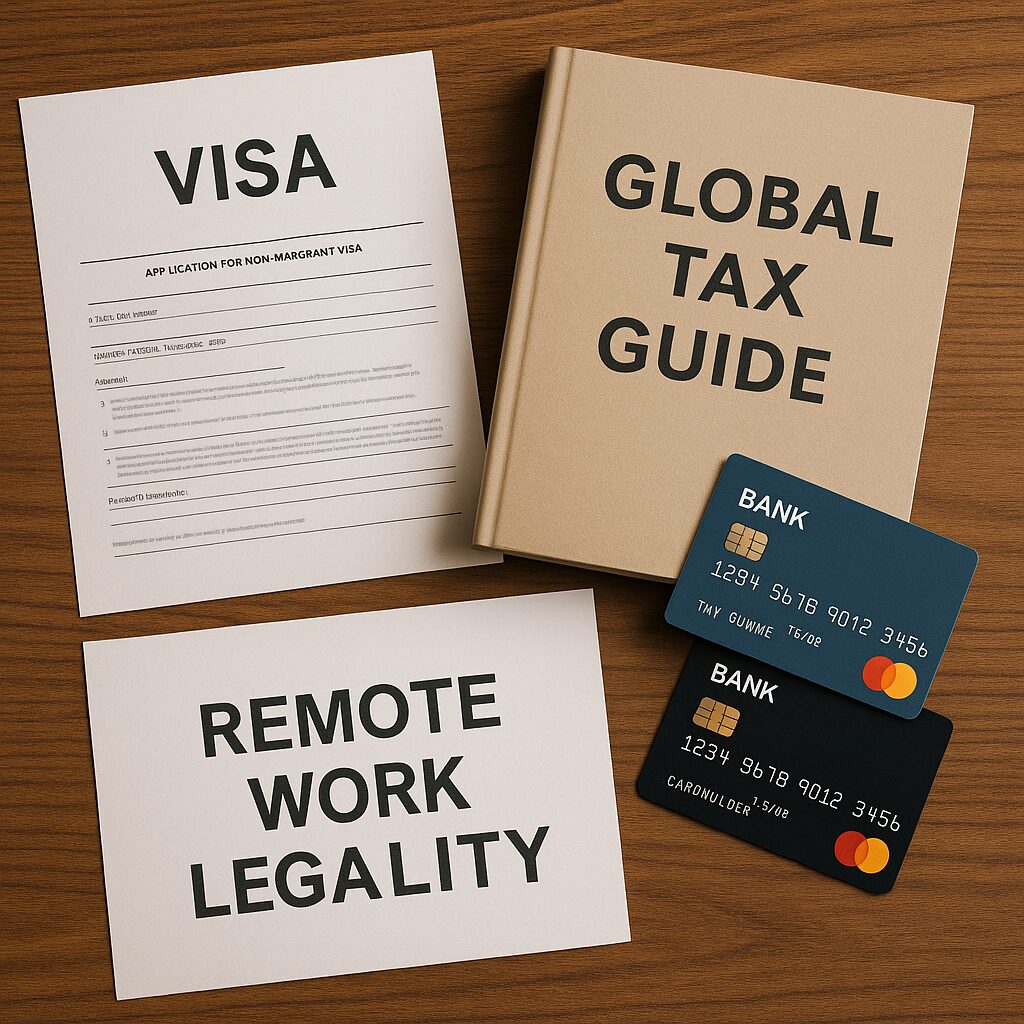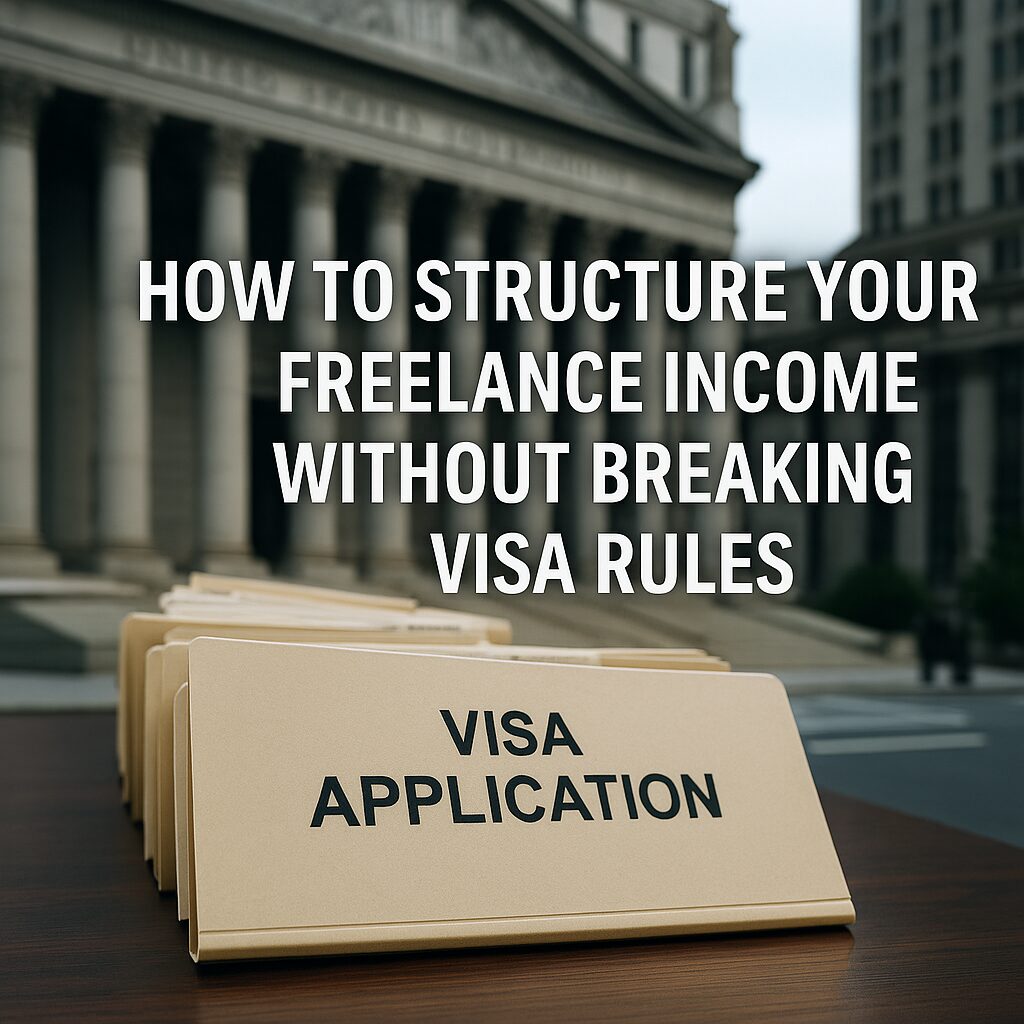1. Why Remote Work and Visas Don’t Always Mix
Working online from anywhere in the world sounds like a dream, but for visa holders, it can be a legal minefield. Whether you’re traveling on a tourist visa, student visa, or digital nomad visa, earning money online may or may not be allowed—depending on how you do it.
The reality is that remote work is not always “remote” in legal terms. Governments care about:
- Where you physically are when you work
- Who pays you
- Where your client or employer is located
- Where your income is taxed
Failing to follow the rules—even unintentionally—can result in visa cancellation, fines, or future bans. That’s why understanding how to work online legally while abroad is crucial for digital nomads, freelancers, and remote workers.
2. The 3 Legal Pillars of Remote Work Abroad
If you want to work online while traveling or staying abroad, these are the three legal concepts that matter:
✅ 1. Your Visa Type
What does your current visa allow?
- Tourist visas (B-1/B-2, Schengen, etc.): Often forbid all forms of work—even remote freelance income
- Student visas (F-1, Tier 4, etc.): Usually restrict employment to on-campus or sponsor-approved jobs
- Digital nomad visas: Designed to allow remote work—but with strict eligibility and tax rules
- Permanent residency / long-term visas: Often provide more freedom but may require local tax reporting
✅ 2. Tax Residency
You can be considered a tax resident in a country just by staying over 183 days per year—even without earning income there.
If you’re working online, authorities might assume:
- You’re earning domestic income
- You need to register as self-employed
- You owe taxes locally
Always check the local tax code of the country you’re staying in for more than 3 months.
✅ 3. Source of Income
Some governments allow remote work if your clients/employer are based abroad, and you’re not competing with local labor.
Example:
Spain’s digital nomad visa allows you to work remotely only if 80% of your income comes from outside Spain.
3. Countries That Welcome Legal Online Work
Here are countries with clear legal frameworks for remote work or digital nomadism:
| Country | Visa Type | Length | Tax Impact |
|---|---|---|---|
| 🇪🇪 Estonia | Digital Nomad Visa | 1 year | Taxed if >183 days |
| 🇵🇹 Portugal | D7 / Digital Nomad | 1–2 years | Taxed locally, NHR benefits |
| 🇨🇷 Costa Rica | Rentista Visa | 2 years | Requires income proof |
| 🇭🇷 Croatia | Digital Nomad Visa | 1 year | No local tax under 183 days |
| 🇲🇺 Mauritius | Premium Visa | 1 year | Tax-exempt under certain conditions |
| 🇮🇨 Canary Islands (Spain) | N/A | Via Spain | Local registration required if staying >6 months |
Note: U.S. citizens must report global income to the IRS regardless of location.
4. How to Structure Your Online Work Legally
Here’s how to legally work online from abroad without risking your visa or future immigration status:
✅ Step 1: Check your visa or entry status
Before accepting online work, verify:
- Does your visa explicitly prohibit any paid activity?
- Are there exceptions for remote work or self-employment?
✅ Step 2: Separate your banking and tax records
Use:
- International payment platforms (Payoneer, Wise, Deel)
- Business bank accounts registered in a country where you’re legally allowed to operate
Avoid using local bank accounts to receive freelance payments unless you’re registered as a business there.
✅ Step 3: Register your business in a digital-friendly country
Examples:
- U.S. LLC (Wyoming, Delaware): Easy setup, widely accepted
- Estonian e-Residency: Tax-efficient for non-residents
- UK Ltd company: Ideal for freelancers with EU clients
This gives you a legal base for invoicing clients and paying taxes.
✅ Step 4: Understand double taxation rules
Use tax treaties to avoid being taxed twice on the same income.
Example:
A Canadian freelancer working in Germany may avoid double taxation via the Canada–Germany tax treaty.
✅ Step 5: Always keep proof of work location
In case of visa audits or future immigration applications, keep:
- Travel itineraries
- Remote work contracts
- Screenshot logs of time tracking or client communications
5. Common Mistakes That Trigger Legal Problems
Working online on a tourist visa without checking legal implications
Earning income through a local bank account without business registration
No tax filing in home or host country (even if income is small)
Mixing personal & business transactions
Ignoring visa renewal rules while still earning online
Even if you’re only making $500/month online, it can raise red flags if not legally documented.
6. Real Stories: Remote Workers Who Did It Right
🇮🇳 A freelance developer in Portugal
- Entered via D7 visa
- Registered LLC in the U.S.
- Paid Portuguese taxes under NHR
✅ Result: Fully legal, later applied for PR
🇰🇷 A graphic designer in Estonia
- Used e-Residency to form company
- Paid taxes in Korea + Estonia treaty
✅ Result: Approved for digital nomad extension
🇺🇸 A digital consultant in Mexico
- Stayed <180 days
- Worked remotely with U.S. clients
- Avoided local tax obligations
✅ Result: Clean tax records + legal compliance
7. Practical Checklist: Can You Work Online Legally?
Use this quick test:
| Question | Yes | No |
|---|---|---|
| Is your visa okay with remote work? | ✅ | |
| Are you earning from foreign clients only? | ✅ | |
| Are you paying taxes somewhere? | ✅ | |
| Is your bank account/business set up properly? | ✅ | |
| Have you stayed under the tax residency limit? | ✅ |
3 or more ✅ = You’re likely safe
Any = Time to fix it before issues arise
8. Final Tip: Remote Work Is Freedom—Only If You Stay Compliant
The biggest myth in digital nomad life is:
“As long as I’m not bothering anyone, I can work from anywhere.”
The truth is:
Immigration and tax laws do care where your laptop is.
With the right visa, tax plan, and structure, you can work online legally and safely from almost anywhere.
📌 Coming Up Next
“The Digital Nomad’s Tax Toolkit – How to Legally Reduce Global Tax While Traveling”
→ Learn how to structure your freelance business, use international tax treaties, and set up the right entity to save thousands legally.


